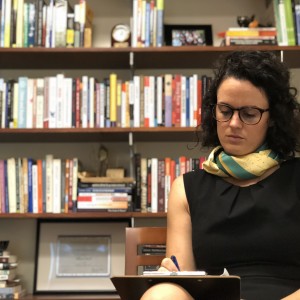Allison Anoll, Ph.D.
allison.p.anoll@vanderbilt.edu
Vanderbilt University

City: Nashville, Tennessee
Country: United States
Research Interests
Political Participation
Race, Ethnicity and Politics
Political Psychology
Countries of Interest
United States
My Research:
Allison Anoll's research focuses on American political behavior. Specifically, Allison studies how social context affect political participation, especially among racial and ethnic minorities. Her past works explore how social norms and racial segregation shape the contours of American political participation. Additional work considers how social connections to the carceral state, including having close connections with convicted felons, shape political attitudes and participation; race socialization and social movements; and the social construction of race.
Publications:
Journal Articles:
Classic political behavior studies assert that childhood socialization can contribute to later political orientations. But, as adults consider how to introduce children to politics, what shapes their decisions? We argue socialization is itself political with adults changing their socialization priorities in response to salient political events including social movements. Using Black Lives Matter (BLM) protests and race socialization as a case, we show the summer 2020 information environment coupled movement-consistent concepts of race with child-rearing guidance. A survey of white parents after the summer activism suggests that many—but especially Democrats and those near peaceful protest epicenters—prioritized new forms of race socialization. Further, nearly 2 years after the protests’ height, priming BLM changes support for race-related curricular materials among white Americans. Our work casts political socialization in a new light, reviving an old literature, and has implications for when today’s children become tomorrow’s voters
Recent studies provide conflicting accounts of whether indirect contact with the American carceral state mobilizes. We revisit this controversy, using a large national survey of Black Americans that includes a novel measure of social connections to people with felony convictions to examine spillover dynamics. We find that while ties to the carceral state are widespread, the impact of these connections on participation is moderated by the severity of state-level felony disenfranchisement laws. In states with the most severe disenfranchisement policies, close ties to people with felony convictions increase both voting and nonvoting participation, but there is no effect in states with more moderate laws. The findings suggest that surrogate participation may be at work, whereby formally removing the rights of one group in a way that seems extreme or unjust mobilizes those close to them, and highlight the importance of policy context on political behavior.
Social norms are thought to motivate behaviors like political participation, but context should influence both the content and activation of these norms. I show that both race and neighborhood context moderate the social value of political participation in the United States. Using original survey data and a survey experiment, I find that Whites, Blacks, and Latinos not only conceptualize participation differently, but also asymmetrically reward those who are politically active, with minority Americans often providing more social incentives for participation than Whites. I combine this survey data with geographic demography from the American Community Survey and find that neighborhood characteristics outpace individual-level indicators in predicting the social value of political participation. The findings suggest that scholars of political behavior should consider race, place, and social norms when seeking to understand participation in an increasingly diverse America.
Books Written:
Many argue that “civic duty” explains why Americans engage in politics, but what does civic duty mean, and does it mean the same thing across communities? Why are people from marginalized social groups often more likely than their more privileged counterparts to participate in high-cost political activities? In The Obligation Mosaic, Allison P. Anoll shows that the obligations that bring people into the political world—or encourage them to stay away—vary systematically by race in the United States, with broad consequences for representation. Drawing on a rich mix of interviews, surveys, and experiments with Asian, Black, Latino, and White Americans, the book uncovers two common norms that centrally define concepts of obligation: honoring ancestors and helping those in need. Whether these norms lead different groups to politics depends on distinct racial histories and continued patterns of segregation. Anoll’s findings not only help to explain patterns of participation but also provide a window into opportunities for change, suggesting how activists and parties might better mobilize marginalized citizens.